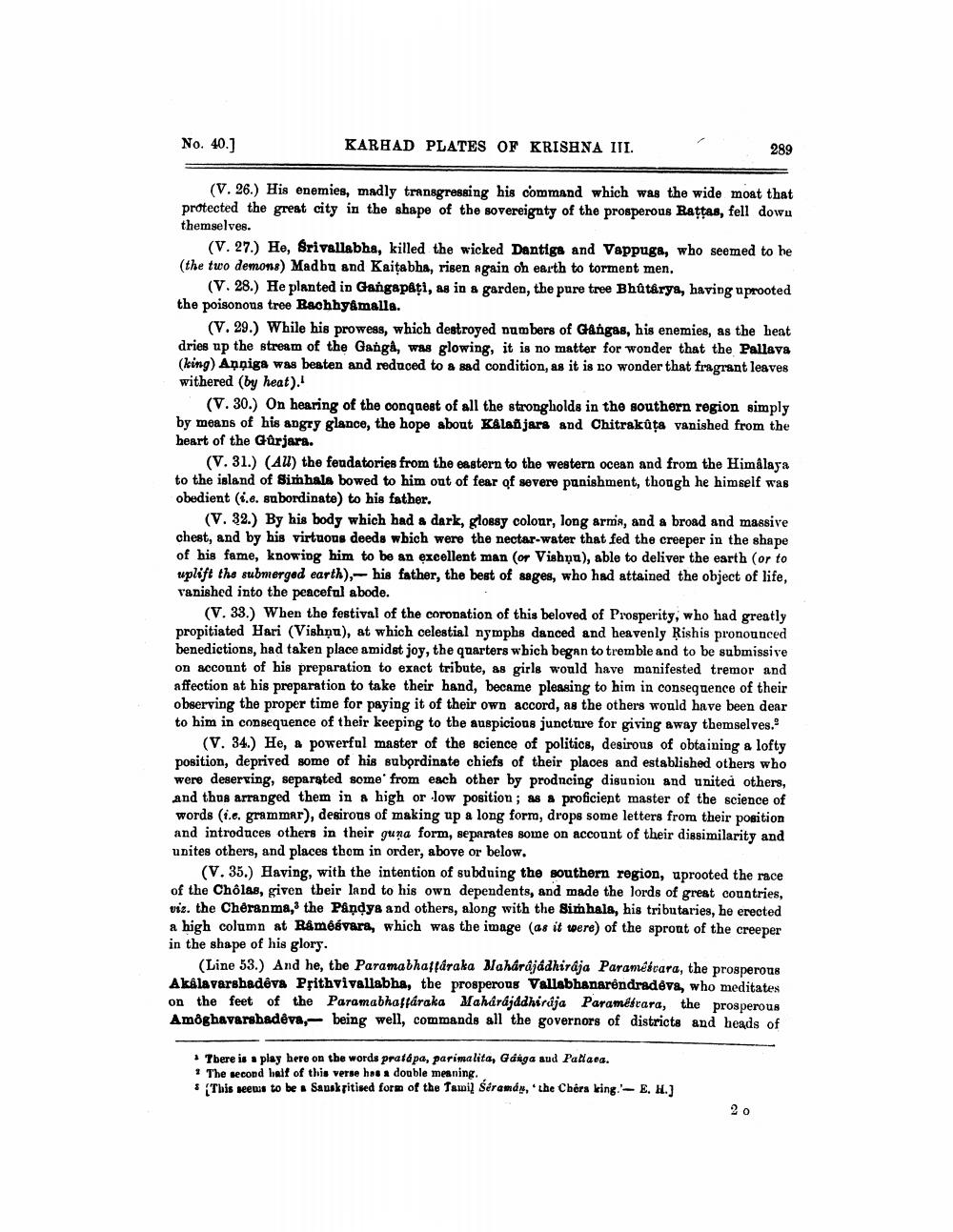________________
No. 40.)
KARHAD PLATES OF KRISHNA III.
289
(V. 26.) His enemies, madly transgressing his command which was the wide moat that protected the great city in the shape of the sovereignty of the prosperous Rattas, fell dowu themselves.
(V. 27.) He, Srivallabha, killed the wicked Dantiga and Vappuga, who seemed to he (the two demons) Madbu and Kaitabha, risen again on earth to torment men.
(V. 28.) He planted in Gangap&ți, as in a garden, the pure tree Bhütärya, having uprooted the poisonous tree Bachhyamalla.
(V. 29.) While his prowess, which destroyed numbers of Gangas, his enemies, as the heat dries up the stream of the Ganga, was glowing, it is no matter for wonder that the Pallava (king) Appiga was beaten and reduced to & sad condition, as it is no wonder that fragrant leaves withered (by heat).
(V. 30.) On hearing of the conquest of all the strongholds in the southern region simply by means of his angry glance, the hope about Kalan jars and Chitrakūta vanished from the heart of the Gürjara.
(V. 31.) (AU) the fendatories from the eastern to the western ocean and from the Himalaya to the island of Sinhala bowed to him ont of fear of severe punishment, though he himself was obedient (1.6. subordinate) to his father.
(V. 32.) By his body which had a dark, glossy colour, long arms, and a broad and massive chest, and by his virtuous deeds which were the nectar-water that fed the creeper in the shape of his fame, knowing him to be an excellent man (or Vishnu), able to deliver the earth (or to uplift the submerged earth), - his father, the best of sages, who had attained the object of life, Vanished into the peaceful abode.
(V. 33.) When the festival of the coronation of this beloved of Prosperity, who had greatly propitiated Hari (Vishnu), at which celestial nymphs danced and heavenly Rishis pronounced benedictions, had taken place amidst joy, the quarters wbich began to tremble and to be submissive on account of his preparation to exact tribute, as girls would have manifested tremor and affection at his preparation to take their hand, became pleasing to him in conseguence of their observing the proper time for paying it of their own accord, as the others would have been dear to him in consequence of their keeping to the auspicions juncture for giving away themselves.
(V. 34.) He, a powerful master of the science of politics, desirous of obtaining a lofty position, deprived some of his subordinate chiefs of their places and established others who were deserving, separated some from each other by prodncing disunion and united others, and thus arranged them in a high or low position; as a proficient master of the science of words (i... grammar), desirous of making up a long form, drops some letters from their position and introduces others in their guna form, separates some on account of their dissimilarity and unites others, and places them in order, above or below.
(V. 35.) Having, with the intention of subduing the southern region, uprooted the race of the Cholas, given their land to his own dependents, and made the lords of great countries, viz. the Chêranma, the Pandya and others, along with the Sinhala, his tributaries, he erected a high column at Råmêsvara, which was the image (as it were) of the sprout of the creeper in the shape of his glory.
(Line 53.) And he, the Paramabhaffaraka Maharajadhiraja Paraméscara, the prosperous Akalavarshadêva Prithvivallabha, the prosperous Vallabhanarendradeva, who meditates on the feet of the Paramabhaffaraka Maharajadhiraja Paramétrara, the prosperous Amoghavarsbadeva,- being well, commands all the governors of districts and heads of
* Tbere is a play here on the words pralapa, parimalita, Gdaga aud Pallara. + The second half of this verse has a double meaning. $ This seems to be a Sanskritised form of the Tamil Seramay, the Chéra king.'-E, H.]




